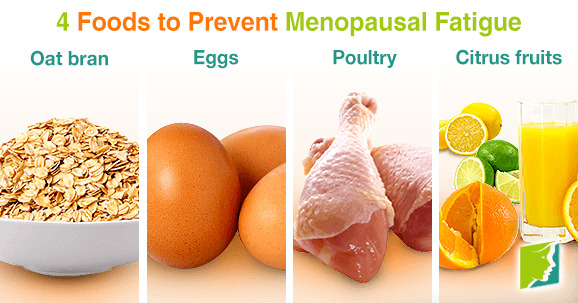Fatigue is one of the most common symptoms of menopause, with around 80% of women falling victim to it. The condition is quite debilitating and can have negative consequences on everyday life, being characterized by symptoms such as heavy eyelids, lack of motivation, and irritability - all of which can affect work and social life. The causes of menopausal fatigue seem to be related to hormonal imbalances, particularly the primary female sex hormones, estrogen and progesterone, although diet also seems to play a chief role, and there are certain foods known to increase energy.
Oat Bran
This is an excellent source of slow-release energy, and is often eaten as part of a healthy breakfast. There are studies that show oat bran to increase endurance and reduce the post-exercise inflammatory response of the muscles. Therefore, less recovery time is needed after physical exertion. Often, a sufferer will feel tired from simple tasks, such as cleaning or shopping, so oat bran will reduce the physical effects felt by the muscles.
Eggs
A feeling of energy relies heavily on muscle strength, and the amino acids that make up protein are essential for building muscle mass. During menopause, muscle mass decreases at an average rate of 0.6% per year, and this can result in menopausal fatigue. Although there are many good food sources of protein, eggs are one of the best. Cooking eggs in a healthy way, such as boiling or poaching, and eating them regularly should stave off feelings of fatigue, at least to some degree.
Poultry
Poultry contains that all-important protein, but it is also an excellent source of iron. Iron is one of the most important nutrients for preventing menopausal fatigue, because it increases the amount of red blood cells produced. The more red blood cells in the bloodstream, then the more efficiently oxygen is being transported around the body and being delivered to the major organs. This means that they are functioning at their optimum level and producing the energy needed for a feeling of motivation and vigor.
Citrus Fruits
Research studies have shown vitamin C to be a safe and effective way of reducing menopausal fatigue symptoms by working in two main ways. Primarily, it aids the absorption of iron and metabolism of protein; therefore, eating these nutrients together yields the best preventative effects. Additionally, vitamin C is a natural antioxidant, so it rids the body of harmful free radicals that cause damage to muscle tissue. Increasing the intake of fruits, especially citrus fruits, will protect muscles from harm and prevent menopausal fatigue.
Menopausal fatigue is not uncommon, but does not have to be an inevitable part of menopause. Eating a varied diet that includes a range of vitamins and minerals is the safest and healthiest way to prevent this symptom taking control of your life. However, if the fatigue persists, it is important to seek medical advice. Read more about the best treatment approaches for fatigue.
Sources
- BBC Good Food (n.d.). Best sources of protein. Retrieved September 26, 2014, from http://www.bbcgoodfood.com/howto/guide/best-sources-protein
- Centers for Disease Control and Prevention. (2011). Iron and Iron Deficiency. Retrieved September 26, 2014, from http://www.cdc.gov/nutrition/everyone/basics/vitamins/iron.html
- Donnatto, F.F. et al. (2010). Effect of oat bran on time to exhaustion, glycogen content and serum cytokine profile following exhaustive exercise. Journal of the International Society of Sports Nutrition, 7, 32. doi: 10.1186/1550-2783-7-32
- Hallberg, L. , Brune, M. & Rossander, L. (1989). The role of vitamin C in iron absorption. International journal for vitamin and nutrition research, 30, 103-108. Retrieved from http://www.ncbi.nlm.nih.gov/pubmed/2507689
- Love, S. & Lindsey, K. (2003). Dr. Susan Love's Menopause &; Hormone Book. New York: Three Rivers Press.
- Suh, S.Y. et al. (2012). Intravenous vitamin C administration reduces fatigue in office workers: a double-blind randomized controlled trial. Nutrition journal, 11, 7. doi: 10.1186/1475-2891-11-7



